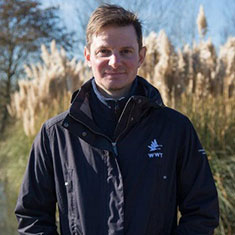Dr. Jonathan Reeves
Principal Research Officer (Health & Wellbeing)

About me
Before WWT I worked as a molecular biologist studying the genomics of wild plant-virus ecology for The Centre for Ecology and Hydrology (CEH) in Oxford. This work culminated with a PhD in Environmental Genomics from the University of Birmingham. After seven years in research I switched to applied conservation. I joined WWT as a volunteer in 2011, initially working for three months with the Slimbridge reserve team before finding a position working in ecosystem health at WWT. I now work on the social dimensions of wetland conservation, I have a particular interest in the human health and wellbeing impacts of wetlands and how our evidence in this area can be best applied for conservation gain.
My role
I lead WWT’s Blue Prescribing Project, which delivers structured wetland-based health programmes at WWT centres. Most recently, I’ve been collaborating with the University of Exeter who are developing a clinical trial for nature prescribing.
Alongside this, I head up the research into the social dimensions of WWT’s Saltmarsh Solutions project—a pioneering initiative that will create 148 hectares of new saltmarsh on the Awre peninsula in Gloucestershire.
I also work with corporate partners to explore how wetlands can spark creativity, support volunteering, and boost wellbeing in the workplace.
With Cardiff University, I’m supporting research into the wellbeing and nature-connection impacts of WWT’s groundbreaking Generation Wild programme, designed to help young people build lifelong relationships with nature.
Previously, as part of a NERC Valuing Nature placement, I worked with Imperial College London to develop new ways of measuring the psychological and physiological benefits of visiting urban wetlands.
In 2019, I was awarded a Churchill Fellowship to travel to Japan and South Korea, where I studied Shinrin Yoku—or “forest bathing”—and reported recommendations for the UK from my findings.
In addition to health and wellbeing I have also worked on broader wildlife health projects such as the development of the Ramsar Wetland Disease Manual and WWT’s campaign to prevent wildlife poisoning from lead ammunition.
Experience and interests
Project management – Development, delivery, research and evaluation of projects that bring people to wetlands to promote health.
Communication – Written and verbal communication to a variety of audiences including: written and broadcast media, academics, policy makers, funders, research participants, nature-based health intervention participants and the general public.
Teaching and supervision – I guest lecture for various masters programmes on the relationship between nature and health and co-supervise a number of PhD students:
Current students
- Hannah Forbes (University of Exeter’s European Centre for the Environment and Human Health (ECEHH)) studying nature based programmes and health inequalities
- Magie Junker (Cardiff University) studying the impacts of WWT’s Generation Wild programme on nature connection, health and wellbeing and care and concern for the environment.
Past students
- Richard Belcher (Imperial College London) studying factors that influence the relationship between residential natural environment exposure and health.
- Nicola Parkin (Cardiff University) evaluating WWT’s Generation Wild programme and examining barriers to nature access for school children.
Research – Qualitative and quantitative research to measure health impacts of natural environments e.g. qualitatively through questionnaires, focus groups and interviews; quantitatively through technological measurement of biological health markers.
Publications
Reeves JP. Forest bathing in Japan and South Korea. Churchill Fellowship; 2024.
Reeves, J.P.; John, C.H.D.; Wood, K.A.; Maund, P.R. A Qualitative Analysis of UK Wetland Visitor Centres as a Health Resource. Int. J. Environ. Res. Public Health 2021, 18, doi:10.3390/ijerph18168629.
Reeves, J.P.; Knight, A.T.; Strong, E.A.; Heng, V.; Neale, C.; Cromie, R.; Vercammen, A. The application of wearable technology to quantify health and wellbeing co-benefits from urban wetlands. Frontiers in Psychology. 2019, 10, 1840.
Maund, P.R.; Irvine, K.N.; Reeves, J.; Strong, E.; Cromie, R.; Dallimer, M.; Davies, Z.G. Wetlands for wellbeing: piloting a nature-based health intervention for the management of anxiety and depression. Int. J. Environ. Res. Public Health 2019, 16, 4413.
Jupe LL, Collins AM, Kirkpatrick L, Newth JL, Reeves JP, Thornton SA, et al. Cultural ecosystem services provided by wetlands. In: The Routledge Handbook of Cultural Ecosystem Services. Routledge. p. 145–56.